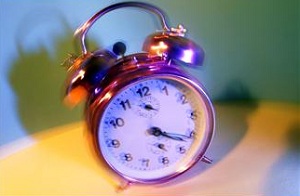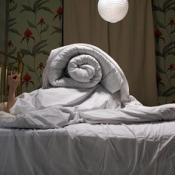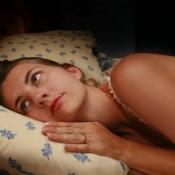 In modern times, it seems to be nearly impossible to find one person who does not have at least some type of sleep problem. Researchers from Northumbria University in the UK confirmed that many people are indeed having sleeping issues, and many are experiencing acute insomnia.
In modern times, it seems to be nearly impossible to find one person who does not have at least some type of sleep problem. Researchers from Northumbria University in the UK confirmed that many people are indeed having sleeping issues, and many are experiencing acute insomnia.
In fact, around one third of UK inhabitants experience acute insomnia every year, according to a university news release. This study claims to be the first of its kind to determine prevalence and incidence rates of acute insomnia. “The findings revealed that acute insomnia was widespread, with almost nine per cent of the U.S. sample and eight percent of the UK sample suffering episodes of acute insomnia during the study period,” according to the new release. “For the first time, the results also indicate the rate of transition from acute to chronic insomnia (21.43 percent), although this figure is higher if it is not the first episode of insomnia.”
The study abstract stated that 2,861 subjects were from the United States, and 1,095 were from the United Kingdom. Acute insomnia is considered to be sleep issues that last at maximum 3 months, compared to chronic insomnia that lasts more than 3 months, according to the study.
According to the National Heart Lung and Blood Institute (NHLBI), acute insomnia is generally caused by situations involving stress or trauma. Chronic insomnia is generally a result of “medical conditions, medicines, sleep disorders, and substances.” Chronic insomnia is sometimes referred to as secondary insomnia because it tends to be caused by outside sources such as those listed. An additional type of insomnia is called primary insomnia, and it isn’t the result of symptoms or side effects from other issues. In fact, it’s linked more often to psychological issues (not caused by other mental disorders) and is listed in the Diagnostic and Statistical Manual of Mental Disorders.
Other experts have additional information regarding acute and chronic insomnia. Janet Kennedy, a clinical psychologist who specializes in insomnia treatment, said in an email that she considers insomnia to be acute when it lasts less than a month and chronic when it lasts more than a month.
“Acute insomnia is typically caused by some form of stress that is fairly easy to identify,” Kennedy said. “Acute insomnia can become chronic when the person’s short-term coping strategies create long-term problems. For example: sleeping late after a bad night might make a person feel better the next day, but it distorts the body clock, making it more difficult to fall asleep the next night. Acute insomnia also causes a lot of anxiety about sleep, which encourages more counterproductive behavior and makes it difficult to quiet the mind and body at bedtime.”
She said that in addition, there are primary and secondary insomnia, which refer to the cause of the actual insomnia. Sometimes secondary insomnia can be caused by psychiatric disorders like major depression and generalized anxiety. Some medical problems that can lead to secondary insomnia are reflux, pain conditions, and thyroid issues.
For people with acute insomnia, there are treatment methods available. Sometimes medication is prescribed, but it can have its downfalls.
“Medication is often prescribed for acute insomnia and it can be helpful if the cause of the problem is transient,” Kennedy said. “However, people who take sleep medication regularly can become more anxious about their ability to fall asleep naturally. That anxiety makes it harder to fall asleep without medication, and that can lead to a form of psychological addiction. Some medications (benzodiazepines like Xanax and Klonipin) are also physically addictive, which makes insomnia worse when they are discontinued.”
There are lifestyle changes that can help relieve acute insomnia. “Most acute insomnia can be managed with good sleep hygiene and stress management,” Kennedy said. “That involves establishing a bedtime routine, limiting caffeine and alcohol, avoiding naps, staying out of bed until you are sleepy, and getting out of bed if you are unable to sleep. Setting an alarm and getting up at the same time every day—regardless of how well you slept—will set the body clock and re-establish a healthy rhythm.”
Therapy is also an option. “More intensive treatment would involve cognitive behavioral therapy, a short-term psychotherapy treatment specifically designed to address the behaviors and thought process at the heart of insomnia,” Kennedy said. “CBT for insomnia has been found to be more effective and longer lasting than treatment with medication.”
Kennedy has some advice for how people can try to prevent acute insomnia from developing. “Good sleep hygiene is most important. Part of good sleep hygiene includes learning to unplug and separate your day from your night,” she added. “Turning off work email and phone calls will give you time to unwind and quiet your mind before bed. Stress management is important as well. Acute insomnia develops in times of stress, when people often feel as though they have no time to maintain their usual healthy habits like exercise or relaxation. But those activities are even more important at those times because they reduce the stress that can contribute to insomnia.
For people who are already experiencing acute insomnia, here are some tips from Kennedy:
- Set a time in the evening to unplug. It might be 9 or 10 p.m., but it is important to set that boundary.
- Turn off all screens (phones, iPads, televisions) at least one hour before bed. If you read on an electronic device, try to use one that is not backlit.
- Create a bedtime routine that is relaxing to you.
- Do not get into bed until you are sleepy.
- If you are not asleep in 15-20 minutes, get out of bed and do something quiet like reading until you are ready to sleep. Repeat as many times as necessary.
- Set your alarm and get up at the same time every day.
- Limit caffeine and alcohol.
- Exercise during the day or early evening.
If you’re concerned that you have acute insomnia, here are two main symptoms Kennedy says to look for:
- Difficulty falling asleep (more than 30 minutes) three or more times per week.
- Waking up three or more times per night and having difficulty returning to sleep (three or more times per week).
Besides the obvious fatigue (and a list of other medical issues) that acute insomnia can lead to, there are some mental health consequences of acute insomnia as well.
“Insomnia can cause symptoms such as anxiety, panic, feelings of helplessness, and feelings of depression,” Kennedy said.
Jonathan Schiff, a clinical social worker, said in an email that insomnia is generally defined by whether a person has trouble falling asleep, gets up frequently during the night or wakes up too early. He added that “it’s normal to experience these things at times.”
For people with acute or chronic insomnia, he suggests the following treatment options.
“People with insomnia can go to a sleep clinic to determine if there is a medical problem such as an apnea,” Schiff said. “Psychotherapists (such as clinical social workers, mental health counselors, and psychologists) can help people learn relaxation skills and other behaviors to prepare for sleep. Sometimes there are underlying mental health problems that contribute to insomnia. A psychotherapist can diagnose and treat the underlying problems. Psychiatrists can treat symptoms with medication.”
He added that insomnia and mental health issues tend to revolve in a cause-and-effect pattern.
“Just as mental health disorders can lead to insomnia, insomnia can contribute to depression and anxiety,” Schiff said.
Al Stone, a licensed acupuncturist and doctor of acupuncture and Chinese medicine, said in an email that acute insomnia can be caused by issues like fever or stress or even by eating too big of a meal before bedtime. Although the symptoms don’t last as long, they tend to be more intense.
“Chronic conditions tend to be due to not enough of something, such as the calming mechanisms in the body or a sudden drop in female hormones, as might be encountered during menopause,” Stone said. “Chronic conditions are low-grade, but lingering for a long time.”
He suggests trying Chinese herbs as a treatment option, which is his area of expertise, but it’s most important to find the underlying cause of the insomnia first.
“They don’t all necessarily treat ‘insomnia’ but address the internal causes for insomnia and related conditions such as anxiety, palpitations, etc.,” Stone said. “If the insomnia is associated with a churning stomach, the answer is to not eat a heavy meal for at least two hours before going to bed.”
Stone has a few other suggestions for how people can relieve acute insomnia symptoms.
“Taking something that helps you digest your food such as ‘Po Chai Pills’ or ‘Curing Pills’ are good as-needed remedies for insomnia due to eating too much before bed,” he added. “However, looking to coping methods, I’m a big fan of meditation and sleep hygiene. Meditation is difficult when you have insomnia because it is hard to calm down, but if you can sit up and listen to your breath, it can help a lot. I also ask patients not to have any electronic entertainment in their bedrooms such as TV or a computer. I find books to be okay, but that too is something of a personal choice.”
For insomnia that is related to emotional disturbances, Stone suggests using specific herbs for treatment called “Bupleurum” and “Peony Combination.”
© Copyright 2012 GoodTherapy.org. All rights reserved.
The preceding article was solely written by the author named above. Any views and opinions expressed are not necessarily shared by GoodTherapy.org. Questions or concerns about the preceding article can be directed to the author or posted as a comment below.

 Strategies to Get to Sleep When Life Is Keeping You Awake
Strategies to Get to Sleep When Life Is Keeping You Awake Herbal and Natural Supplements for Insomnia
Herbal and Natural Supplements for Insomnia Signs of Depression in Loved Ones and Children & Teens
Signs of Depression in Loved Ones and Children & Teens